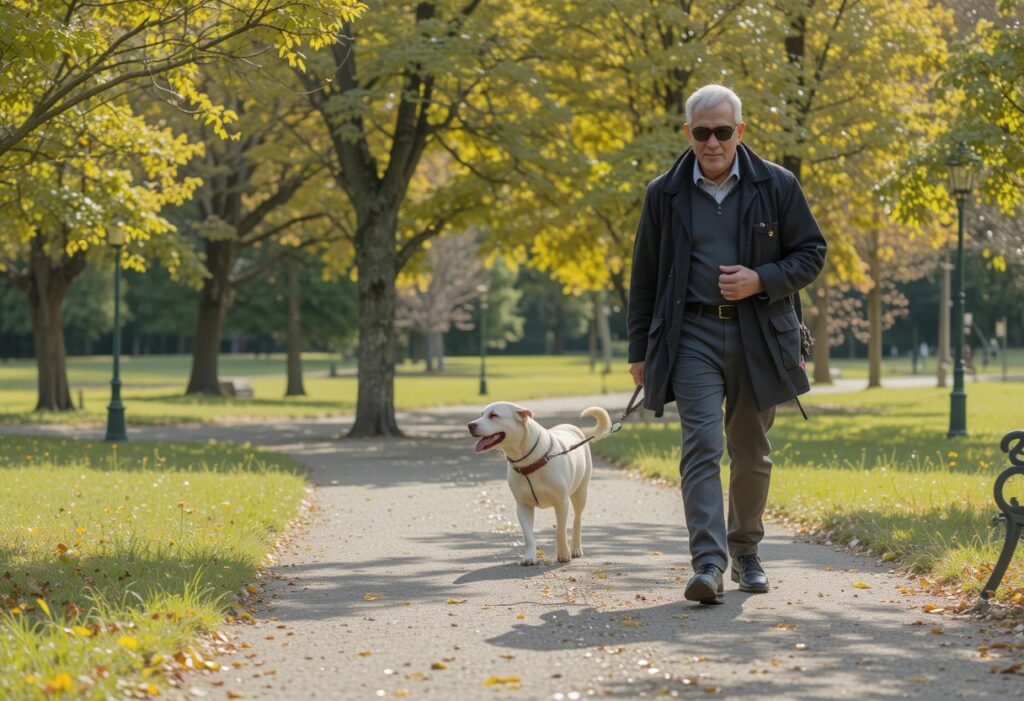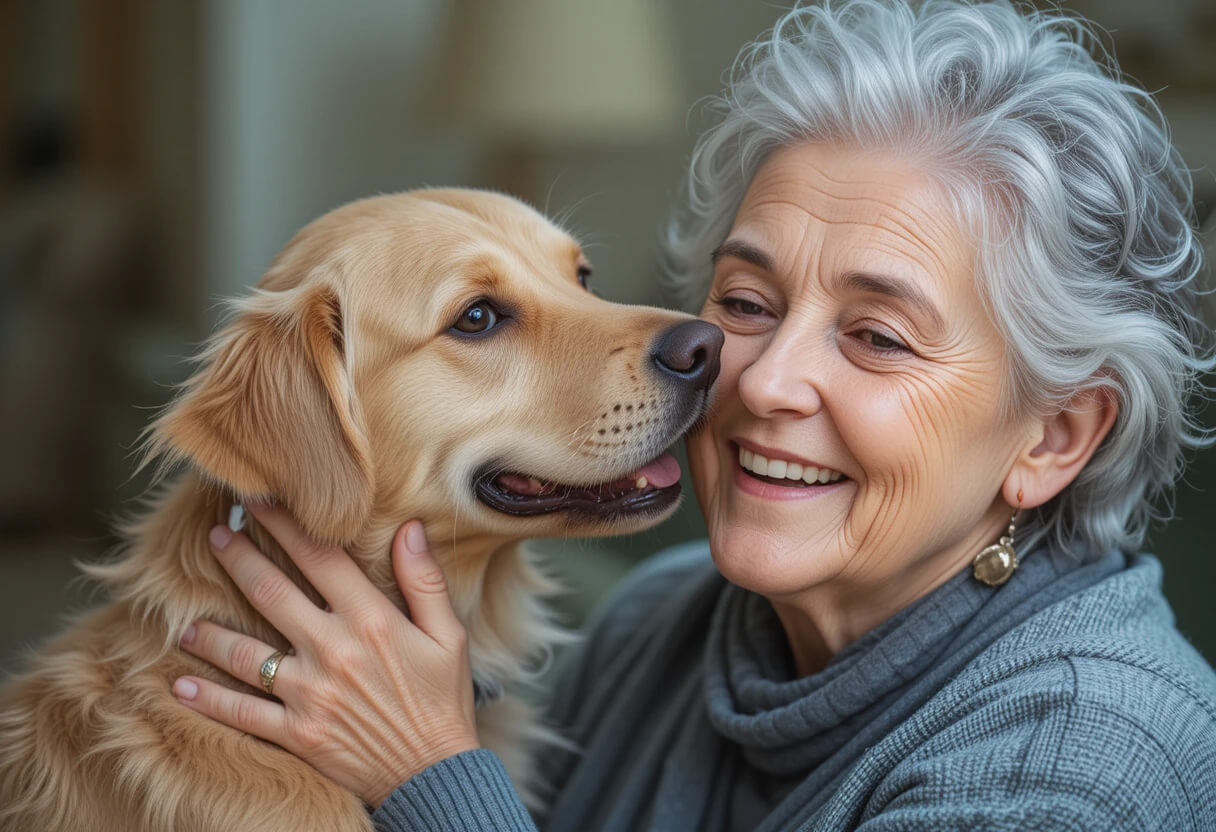As we age, companionship and emotional well-being become increasingly important. For seniors, pets can provide much more than just a furry friend—they can offer emotional support, promote physical activity, and enhance the overall quality of life. Whether it’s a dog, cat, bird, or even a smaller animal like a rabbit, the emotional benefits of pets for seniors are significant.
In this article, we will explore how having a pet can improve the emotional well-being of older adults, reduce feelings of loneliness, encourage physical activity, and even help seniors manage health issues. We’ll also discuss why pets can be an important part of maintaining a fulfilling lifestyle in later years.

Combatting Loneliness with Companionship
One of the most common emotional challenges faced by seniors is loneliness. As people age, they may experience a reduction in social interactions due to retirement, loss of loved ones, or physical limitations that make going out more difficult. This isolation can lead to feelings of depression, sadness, and a general sense of disconnection. However, the Benefits of Pets for Seniors are immense when it comes to alleviating loneliness and providing meaningful companionship.
Pets, especially dogs and cats, are known for their loyal and unconditional love. Their companionship offers a sense of comfort that is especially crucial for older adults living alone. A pet’s need for care and affection can give seniors a sense of purpose, knowing that they are responsible for another living being. The simple act of having a pet nearby can ease feelings of isolation and create an ongoing bond that is both rewarding and comforting. For instance, dogs will often follow their owners around the house or cuddle up with them, providing consistent companionship throughout the day.
Research has shown that owning a pet can reduce feelings of loneliness in seniors by creating a structured daily routine. Many seniors report that their pets are their primary source of emotional support, especially those who live alone. The benefits are clear: pets make fantastic companions who alleviate emotional strain and offer a comforting presence that helps reduce isolation.
Reducing Stress and Anxiety with Pets
As we age, our mental health can be significantly affected by life transitions, health challenges, or the loss of a spouse or loved one. Seniors often find themselves dealing with stress, anxiety, or even depression, and these feelings can sometimes be overwhelming. However, one of the hidden Benefits of Pets for Seniors is the way pets help reduce stress and anxiety, bringing a sense of calm and relaxation.
Studies have proven that simply petting a dog or cat can lower cortisol (the hormone related to stress) and increase oxytocin (the hormone responsible for happiness). This simple act can have a calming effect on seniors, helping them feel more at ease and emotionally balanced. Petting an animal can be a form of mindfulness, allowing the owner to focus on the moment and forget their worries for a while.
In fact, studies have shown that pets can even have therapeutic effects on seniors with conditions like Alzheimer’s or dementia. The presence of a pet can reduce feelings of agitation and help seniors find comfort, even when they may struggle with verbal communication. The bond between a pet and a senior creates a sense of stability, offering non-verbal communication that can soothe and reduce emotional distress.

Creating a Sense of Purpose and Responsibility
The Benefits of Pets for Seniors extend beyond emotional support and physical activity. Pets can give seniors a much-needed sense of purpose, especially after retirement or during periods of isolation. As people age, it’s common to experience a sense of purposelessness. The loss of work-related responsibilities or a decrease in social activity can leave seniors questioning their role in the world. Pets help fill this gap by providing daily tasks and a feeling of responsibility.
Caring for a pet requires regular attention, such as feeding, grooming, and ensuring their overall well-being. These responsibilities create a structured daily routine that gives seniors something to focus on. For many older adults, this routine of caring for their pets provides a sense of accomplishment and self-worth. Knowing that they are providing love and care for a living creature helps seniors feel needed and valued.
This sense of purpose can also help seniors combat feelings of depression. The act of caring for another living being fosters a positive sense of contribution to the world. The unconditional love that pets offer in return also boosts self-esteem, making seniors feel proud of their ability to nurture and care for their animal companion.
Enhancing Emotional Stability and Mental Health
For seniors, pets can be a powerful source of emotional stability. The emotional bond between a senior and their pet can greatly enhance mental health. Many seniors report feeling less anxious, depressed, and lonely after adopting a pet. This connection provides a unique form of emotional support that helps seniors cope with the challenges of aging.
Having a pet also encourages more positive social interactions, which further improve a senior’s emotional well-being. For example, seniors who walk their dogs often find themselves engaging in casual conversations with other dog owners or neighbors. These social interactions can be beneficial for seniors, as they help prevent isolation and foster a sense of belonging within the community.
Pets also offer seniors a safe outlet for expressing emotions. The act of petting, talking to, or simply spending time with a pet can help relieve negative feelings and improve overall emotional stability. The presence of a pet provides an emotional anchor for seniors, especially during times of sadness or grief, making them feel less alone in their struggles.
Encouraging Physical Activity and Healthy Habits
Aside from emotional support, pets can also encourage physical activity, which is an important factor in maintaining a senior’s overall well-being. Regular movement, such as walking or playing with a pet, can significantly improve physical health and mobility. For seniors, the Benefits of Pets for Seniors in terms of physical health cannot be understated.
Dogs, in particular, require regular walks, which can encourage seniors to get outside and stay active. Even a short walk around the neighborhood provides a gentle form of exercise that helps improve cardiovascular health, boosts mood, and enhances physical mobility. Walking with a pet also provides seniors with the opportunity to engage with others in the community, whether it’s meeting neighbors or other dog owners, which fosters social interaction.
Moreover, physical activity through pet care doesn’t always need to be strenuous. Even light activities such as playing fetch, grooming, or providing care for a cat can help seniors maintain dexterity and hand-eye coordination. Cats, rabbits, and other small pets can also provide a more relaxed form of physical interaction, allowing seniors to enjoy bonding time without the need for high-energy activity.

The Importance of Choosing the Right Pet for Seniors
When considering pets for seniors, it’s important to choose the right type of pet that suits their lifestyle and physical capabilities. Not all pets are appropriate for every senior, as different animals have different needs and energy levels.
For active seniors who enjoy going on walks and outdoor activities, a dog might be the perfect companion. On the other hand, cats or smaller animals like rabbits or guinea pigs can be a good fit for seniors who may prefer a lower-maintenance pet. Birds or fish can also provide a sense of peace and companionship, especially for those who are less physically active.
It’s important for families to consider the senior’s living situation, mobility, and personal preferences when selecting a pet. For example, a senior who lives in an apartment may prefer a smaller dog or a cat, as larger dogs may require more space and outdoor activity.
Pets and Seniors: A Lifelong Bond
The bond between seniors and their pets is truly special. Pets and emotional well-being for seniors is a powerful connection that offers countless benefits. As pets provide companionship, emotional support, and encouragement for physical activity, they also help foster a sense of self-worth, stability, and purpose in the later stages of life.
It’s important to remember that pet ownership is a two-way street. Not only do pets benefit from love and care, but seniors also experience improved quality of life, greater happiness, and emotional health. Whether it’s the wag of a dog’s tail, the purr of a cat, or the flutter of a bird’s wings, pets are powerful companions for seniors—making their later years more fulfilling and emotionally rewarding.
Final Thoughts
The emotional benefits of pets for seniors are immeasurable. From reducing loneliness and stress to encouraging physical activity and providing a sense of purpose, pets play a vital role in improving the quality of life for older adults. Seniors who have pets are more likely to experience greater emotional well-being, better mental health, and an overall enhanced quality of life.
By choosing the right pet and offering them the care and attention they need, seniors can enjoy a deep, meaningful relationship that benefits both the pet and the person. Whether you’re a senior considering getting a pet or a family member looking to support a loved one, it’s clear that pets can make a world of difference for older adults—emotionally, mentally, and physically.
Ready to Become the Best Dog Parent Ever?
Is Your Dog Ready to Live Their Best Life?
Ready to Become the Best Cat Parent Ever?
FAQ
1. How can owning a pet help a senior’s mental health?
Owning a pet can significantly improve a senior’s mental health by providing emotional support, reducing feelings of loneliness, and lowering stress. Pet companionship offers comfort and can help seniors feel more connected and less isolated. The act of caring for a pet also creates a sense of purpose and boosts self-esteem, contributing to a more positive outlook on life.
2. Are there specific types of pets that are easier for seniors to care for?
Yes, the ideal pet for a senior depends on their physical abilities, living situation, and personal preferences. Smaller, lower-maintenance pets like cats, guinea pigs, or fish may be more suitable for seniors with limited mobility or living in smaller spaces. For more active seniors, a small dog or an older dog that doesn’t require excessive exercise might be a great fit.
3. What are the social benefits of pets for seniors?
Pets provide seniors with an opportunity to interact socially. Whether it’s taking a dog for walks, meeting other pet owners, or simply having a pet around, seniors often experience more social interaction. This can help reduce isolation and encourage seniors to engage with others, leading to an improved sense of community and belonging.
4. How can a pet improve a senior’s physical health?
Having a pet can encourage seniors to stay active, which is important for maintaining mobility and cardiovascular health. Regular activities like walking a dog or playing with a pet can provide essential exercise. Pets also offer a non-strenuous way to stay engaged physically, such as grooming or interacting with smaller pets like cats or rabbits.
5. Can pets help reduce the effects of Alzheimer’s or dementia in seniors?
Yes, pets can play a therapeutic role in reducing agitation and anxiety in seniors with Alzheimer’s or dementia. Interacting with pets can provide emotional comfort, and the routine of caring for a pet can offer structure. Pets also promote positive non-verbal communication and can enhance the senior’s emotional stability, which may help reduce the behavioral challenges often associated with these conditions.
6. Are there any risks associated with pet ownership for seniors?
While pets provide numerous benefits, there are some risks to consider. Seniors with mobility issues or certain health conditions may find it challenging to care for a pet that requires extensive physical care, such as a high-energy dog. It’s important to choose a pet that matches the senior’s ability to provide the necessary care and attention. Families should assess the senior’s needs and choose a pet that complements their lifestyle.
7. How do pets help seniors cope with grief or loss?
Pets can be incredibly comforting for seniors dealing with grief or loss, offering emotional support and companionship during difficult times. The unconditional love and presence of a pet can help fill the void left by the loss of a loved one, providing a sense of comfort and stability. Caring for a pet also offers a sense of purpose, which can help seniors focus on the present and heal emotionally.
8. How can I help a senior select the right pet for their needs?
When helping a senior choose the right pet, consider their health, lifestyle, and living environment. For example, seniors living in apartments may benefit from a low-energy pet like a cat or small dog. Seniors with limited mobility might find a pet like a cat or a small, calm dog easier to care for. It’s also important to consider the pet’s temperament, size, and care requirements to ensure the senior can provide appropriate care.
9. What can I do to make pet ownership easier for a senior?
There are several ways to support seniors with pet ownership, such as helping with pet care tasks like feeding, walking, or cleaning. Ensure the pet is easy to manage by selecting a breed that fits the senior’s activity level. Additionally, you can consider pet assistance programs, hire a pet sitter, or even look for pet-friendly communities that offer support for seniors.
10. What are some common misconceptions about pets and seniors?
One common misconception is that pets are too much responsibility for seniors to handle. While it’s true that some pets require high maintenance, many pets are relatively low-maintenance and can be an excellent fit for seniors. Another misconception is that older adults can’t form strong bonds with pets, but in reality, many seniors develop deep, meaningful relationships with their pets that contribute to their emotional well-being.
11. Can pets be used to help seniors improve cognitive function?
While pets cannot directly improve cognitive function, interacting with pets can have indirect benefits for seniors’ cognitive health. The structure and routine of caring for a pet can help keep seniors mentally engaged and active. In addition, the emotional bonds seniors form with their pets can provide comfort and reduce the stress that may exacerbate cognitive decline. Regular interaction with a pet can also stimulate positive mental engagement.

